All Stories
-
 Materials Science
Materials ScienceWeird materials could make faster computers
Topological insulators could speed up how computers switch between 1s and 0s.
By Andrew Grant -
 Psychology
PsychologySchadenfreude starts young
Children as young as 2 years old feel joy at another’s misfortune, new research suggests, showing jealousy’s deep roots.
-
 Health & Medicine
Health & MedicineBabies’ brains practice words long before they can speak
When listening to speech, babies’ brains are active in motor areas required for moving the mouth and tongue in ways that produce words.
-
 Genetics
GeneticsAirborne MERS virus found in Saudi Arabian camel barn
The air in a Saudi Arabian camel barn holds genetic fragments of MERS, a new study shows.
-
 Ecosystems
EcosystemsMoose drool can undermine grass defenses
Saliva from moose and reindeer sabotages plants’ chemical weaponry.
By Susan Milius -
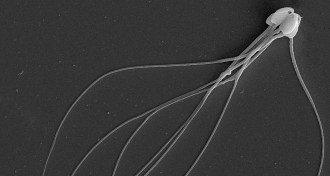 Life
LifeMouse sperm parties make for straight swimmers
Mouse sperm hunt for eggs in packs, but grouping doesn’t boost speed. Instead, gangs of the reproductive cells move in straighter lines.
By Nsikan Akpan -
 Animals
AnimalsElephant’s big nose wins most sensitive sniffer
A genetic survey reveals that African elephants harbor more smell sensors than any other known animal.
By Nsikan Akpan -
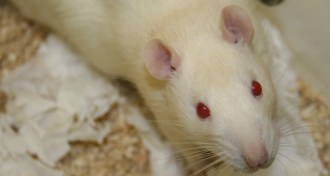 Neuroscience
NeuroscienceFor rats, a break from stress isn’t worth the relief
An unplanned vacation from stress might seem like a good idea, but a new study in rats shows that unpredictable escapes from pressure produce more strain on the first day back.
-
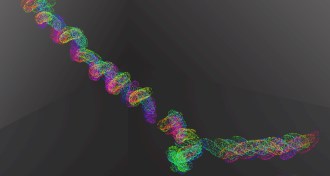 Life
LifeBacteria’s bodies do whirlies to help them swim
Kidney-shaped Caulobacter crescentus bacteria swim with both their corkscrew propellers called flagella and their bodies, scientists say.
-
 Genetics
GeneticsHints about schizophrenia emerge from genetic study
From thousands of genomes, researchers pinpoint dozens of DNA changes that may underlie schizophrenia
-
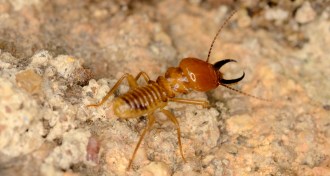 Animals
AnimalsTermite soldiers locate battles with vibrational clues
To locate invasions, termite soldiers listen for millisecond-long delays in vibrational distress signals sent out by other soldiers.
By Susan Milius -
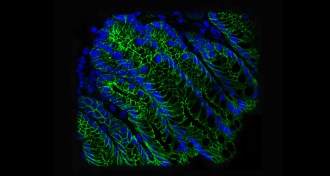 Health & Medicine
Health & MedicineCarbs and gut microbes fuel colon cancer
Western nations experience high levels of colon cancer, and carbo-loading gut microbes might explain why, says a new study in mice.
By Nsikan Akpan